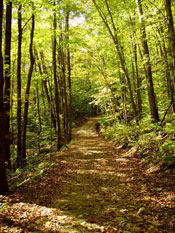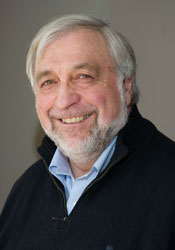 |

For further information, contact the MBL Communications Office at (508) 289-7423 or e-mail us at comm@mbl.edu
FOR IMMEDIATE RELEASE: May 24, 2011
Contact: Diana Kenney, MBL, 508-289-7139; dkenney@mbl.edu
 |
 |
 |
Resources
Citation:
Melillo, J., Butler, S., Johnson, J., Mohan, J., Steudler, P., Lux, H., Burrows, E., Bowles, F., Smith, R., Scott, L., Vario, C., Hill, T., Burton, A., Zhouj, Y, and Tang, J. (2011) Soil warming, carbon–nitrogen interactions, and forest carbon budgets. PNAS: Early Edition May 23, 2011, doi: 10.1073/pnas. 1018189108
PDF of paper

Harvard Forest in Petersham, Massachusetts, a National Science Foundation Long-Term Ecological Research site. Photo by David R. Foster. Click for larger image.

Jerry M. Melillo, Distinguished Scientist, MBL Ecosystems Center, Woods Hole. Photo by Tom Kleindinst. Click for high-resolution image.
Profile of Jerry Melillo, Distiguished Scientist of MBL's Ecosystem Center
This research was supported by the National Science Foundation and the Department of Energy.
|
Global Warming May Affect the Capacity of Trees to Store Carbon, MBL Study Finds
WOODS HOLE, MA—One helpful action anyone can take in response to global warming is to plant trees and preserve forests. Trees and plants capture carbon dioxide during photosynthesis, thereby removing an important greenhouse gas from the atmosphere and storing some of it in their woody tissue.
Yet global warming may affect the capacity of trees to store carbon by altering forest nitrogen cycling, concludes a study led by Jerry Melillo of the Marine Biological Laboratory (MBL), published this week in Proceedings of the National Academy of Sciences.
The paper summarizes the results of a 7-year study at Harvard Forest in central Massachusetts, in which a section of the forest (about one-quarter of an acre) was artificially warmed about 9oF above ambient, to simulate the amount of climate warming that might be observed by the end of the century without aggressive actions to control greenhouse gas emissions from fossil-fuel burning and deforestation.
The study confirmed, as others have, that a warmer climate causes more rapid decomposition of the organic matter in soil, leading to an increase in carbon dioxide being released to the atmosphere.
But the study also showed, for the first time in a field experiment, that warmer temperatures stimulate the gain of carbon stored in trees as woody tissue, partially offsetting the soil carbon loss to the atmosphere. The carbon gains in trees, the scientists found, is due to more nitrogen being made available to the trees with warmer soil.
“Tree growth in many of the forests in the United States is limited by the lack of nitrogen,” Melillo says. “We found that warming causes nitrogen compounds locked up in soil organic matter to be released as inorganic forms of nitrogen such as ammonium, a common form of nitrogen found in garden fertilizer. When trees take up this inorganic nitrogen, they grow faster and store more carbon.”
Melillo says that the biological processes that link soil warming, increased soil organic matter decay, increased nitrogen availability to trees, and increased tree growth will likely operate together in many temperate and boreal forests—forests found in North America, Europe, Eurasia and much of the developed world. Tree growth in tropical forests is often limited by factors other than nitrogen, so lessons from this new study are not widely relevant in the tropics.
While Melillo thinks that the carbon-nitrogen interactions he is studying at Harvard Forest will help us to make predictions of carbon storage in forest over the coming decades, he adds that “the carbon balance of forest ecosystems in a changing climate will also depend on other factors that will change over the century, such as water availability, the effects of increased temperature on both plant photosynthesis and aboveground plant respiration, and the atmospheric concentration of carbon dioxide.”
The Marine Biological Laboratory (MBL) is dedicated to scientific discovery and improving the human condition through research and education in biology, biomedicine, and environmental science. Founded in 1888 in Woods Hole, Massachusetts, the MBL is an independent, nonprofit corporation.
|